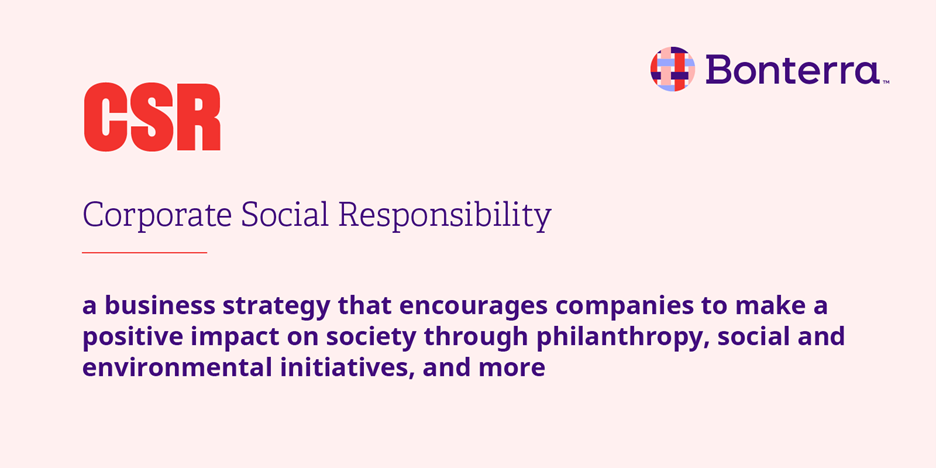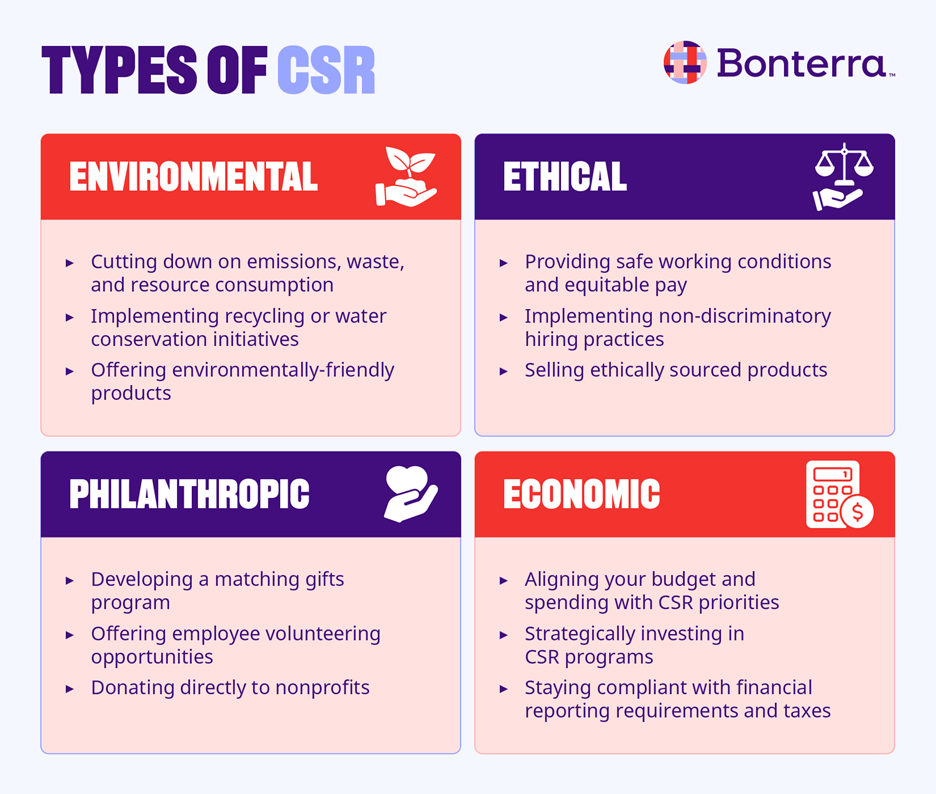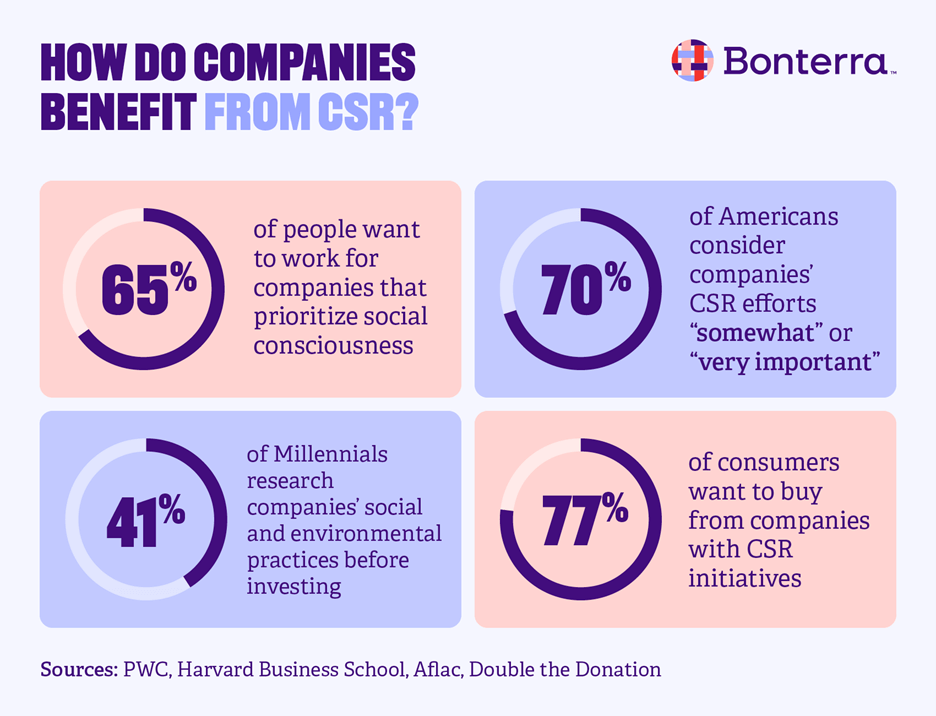Corporations everywhere are embracing the concept of corporate social responsibility (CSR) in their business practices, policies, and employee engagement offerings. But what is CSR, and how can it impact your business’s success long-term? Is it worth investing in for large and small corporations alike?
We’ll answer these questions and more as we explore the basics of CSR in this guide. Plus, we’ll dive into all the ways specialized CSR software like Bonterra Strategic Philanthropy (formerly CyberGrants) can help your company implement and maintain a robust CSR program. Let’s get started.

Corporate social responsibility (CSR) is a business strategy that encourages companies to make a positive impact on society through philanthropic initiatives.
CSR stems from the belief that companies have a responsibility to give back to the communities they operate in. This strategy aims to hold businesses accountable for their societal impact and ultimately inspire more ethical, sustainable business practices throughout the corporate world.
A business’ CSR strategy may include a variety of programs and initiatives, ranging from matching gift programs to a company-wide volunteer day. CSR programs are unique to individual companies, but every program should aim to increase the company’s positive societal impact.
What is the purpose of corporate social responsibility?
The primary purpose of corporate social responsibility is to improve your company’s impact on the world, but there are plenty of additional reasons to create a CSR strategy for your business.
For instance, an innovative CSR strategy can substantially improve employee engagement, retention, and workplace culture. When you cultivate experiences that allow employees to give back to their communities in meaningful ways, you strengthen their belief in your company and give them opportunities to stay engaged. Plus, studies show that employees who volunteer are happier, meaning they’re more likely to be productive, stay satisfied in their roles, and remain at your business long-term.
In addition to engaging employees, well-aligned CSR practices can help your business maintain a positive reputation and retain customers by proving you’re committed to making the world a better place.
The 4 types of CSR
Corporate social responsibility can be broken down into four main types of responsibilities:

Environmental
Environmental CSR includes any program or initiative designed to improve the sustainability or environmental footprint of your company’s operations and products. This might look like:
- Reducing your business’s carbon emissions, waste, and resource consumption.
- Implementing an office recycling or water conservation initiative.
- Offering environmentally-friendly products such as hybrid vehicles, compostable food storage containers, or products made from recycled materials.
Ethical
Your company’s ethical responsibilities include everything from treating workers fairly to selling products that are safe for consumers to use. As you evaluate your business practices, consider taking steps to act more ethically, such as:
- Providing safe working conditions and equitable pay.
- Implementing fair, non-discriminatory hiring practices.
- Selling ethically sourced products.
Philanthropic
Philanthropy is the most well-known and straightforward type of CSR. You can participate in corporate philanthropy by:
- Developing a matching gifts program in which you match employees’ donations to eligible nonprofit organizations.
- Offering employee volunteering opportunities like Dollars for Doers, volunteer time off (VTO), or company-wide volunteer outings.
- Donating directly to nonprofits through corporate grants or sponsorships.
Economic
Lastly, companies’ economic or financial responsibilities refer to the need to balance all of their other CSR efforts with revenue generation and overall business growth. You can keep your business financially responsible by:
- Aligning your budget and spending with your company’s CSR priorities.
- Strategically investing in CSR programs that better both your business and society.
- Staying compliant with financial reporting requirements and taxes.
CSR benefits for companies
As mentioned earlier, CSR can positively impact your business success in many ways. To understand how strategic CSR efforts can improve your company’s employee engagement levels, brand reputation, and customer relations, take a look at the following statistics:

Employee engagement
According to one study, 65% of people want to work for companies that prioritize social consciousness. This means that presenting employees with a benefits package that encompasses employee giving and volunteering is extremely compelling to existing and prospective employees. Employee-led CSR strategies help you attract new talent, boost employee engagement, and achieve higher employee retention rates.
Positive brand reputation
Around 70% of Americans say that a company’s efforts to make the world a better place are “somewhat” or “very important” to them. Similarly, 41% of millennials say they research a company’s’ social and environmental practices before making investment decisions.
These statistics underscore just how much impact CSR can have on your company’s brand reputation. When implemented thoughtfully and successfully, CSR programs give your reputation a major boost and influence employees, customers, and investors alike to support your business.
Improved customer relations
An impressive 77% of consumers want to buy from companies with CSR initiatives, meaning that your business can attract and retain more customers just by implementing CSR programs. Since CSR encourages transparency about your business practices, it can also help you cultivate customers’ trust and loyalty over time.
Corporate social responsibility examples
We’ve mentioned several different forms CSR programs can take, but here are a few examples of the most common ways that companies participate in CSR:
- Matching gift programs: These programs amplify employee engagement initiatives by matching the donations they make to eligible nonprofit organizations. To promote specific causes, you can even offer to match gifts to relevant nonprofits at a higher rate than usual (such as at a 2:1 or 3:1 ratio).
- Payroll deduction: Employee payroll deductions give team members the chance to easily support causes they care about on a recurring basis. CSR solutions like Bonterra Employee Engagement streamline payroll deductions by automating them, allowing employees to give without any extra effort.
- Grantmaking: Companies can support individual nonprofit organizations that align with their values by offering them monetary grants. By providing funds and asking nonprofits to report on how they use them, you can easily and clearly demonstrate your company’s CSR impact.
- Volunteer opportunities: Many CSR programs provide employees with volunteer opportunities, either via featured organizations or by letting employees search for and participate in opportunities independently.
Using the right technology can help you set up and maintain any of these CSR programs while making it easy to expand your offerings in the future. As your company begins its CSR journey, be sure to look for robust solutions to streamline your programs’ management.
How to start a CSR program at your company
The most successful corporations start small and allow their CSR strategy to grow over time. When you’re just getting started, keep in mind that employee engagement is crucial to an effective CSR strategy.
Follow these steps to gradually build a CSR strategy with the right goals in mind:
- Uncover ways your employees are already giving back and outline how your company can amplify those efforts. For example, you might find that most of your employees already volunteer. Make it even easier for them to search for upcoming events and log their hours with help from a software platform. Your company can even double their impact by donating to organizations where employees volunteer their time.
- Consider how your CSR strategy will tie into your company’s values. This will help you clarify the “why” behind your actions and foster more intentional CSR programs. By aligning corporate philanthropy with your company values, you’ll be able to hone in on where you want to direct your efforts and obtain executive and employee buy-in.
- Invest in the right resources to manage CSR programs. With tailored an agile CSR software solution, you’ll reduce administrative work for your team and make it easier for employees to give and participate. Plus, you’ll open a new world of CSR opportunities that would be difficult to implement without a robust solution in place.
- Commit to tracking CSR data to find improvement opportunities. This data will provide insights into how and where your employees give, helping you support their efforts and build your CSR programs around the causes they care about. With actionable data, your executives will also be more likely to offer additional support and resources.
Once you’re up and running with your first CSR initiative, take note of the responses you get from employees, customers, and other stakeholders. Use their input to guide your strategy and align future CSR programs with their interests.
Implementing a CSR strategy with Bonterra
When your company is ready to dive into CSR, Bonterra’s solutions are here to support you. Our comprehensive CSR software is mobile accessible, easy to log into, and supports flexible forms of giving to help you engage employees and grow your CSR strategy over time. Once you have the right technology in place, the possibilities for your CSR programs are endless.




